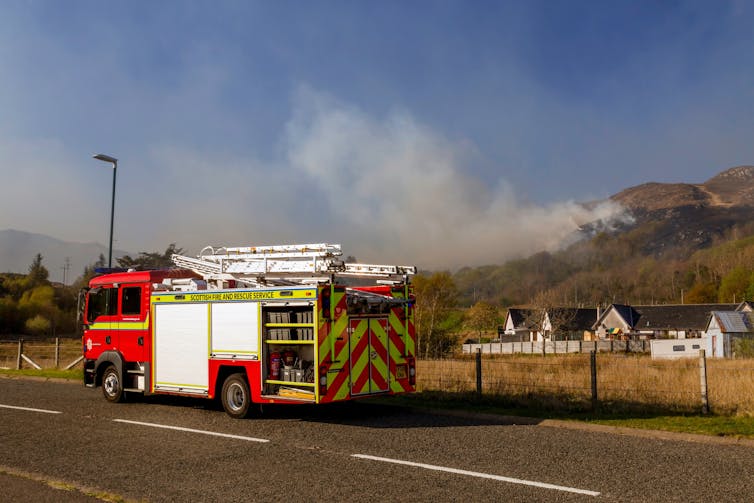Read successive progress reports by the Climate Change Committee (CCC), the UK government’s statutory advisor on climate change, and you sense the growing frustration. Over the years, the CCC’s assessments of the government’s response to the climate crisis have become more critical, its recommendations more explicit and the tone more direct.
The latest progress report from the CCC concerns the UK’s preparedness for climate change, rather than progress toward net zero emissions, but it makes similar conclusions. The committee is scathing and has said that the country is “strikingly unprepared”.
The CCC criticised the government’s national adaptation programme for its lack of vision, ambition and reach. Sector by sector, the report lists failings in the government’s planning for climate change, or where plans exist, in their execution.
Thirteen sectors, from infrastructure and the built environment to health, nature and managed lands are forensically analysed, highlighting that “fully credible” planning is only in place for five of 45 key risk areas, while evidence that the country is becoming less vulnerable to climate change is “lacking across the board.”
If this sounds worrying it should be. It means UK citizens are being left exposed to increased risks of flood damage, food and water shortages, excess deaths from heatwaves, energy outages and infrastructure breakdown, among others.
An international challenge
Internationally, the CCC’s impatience is matched by increasingly urgent messages from the Intergovernmental Panel on Climate Change (IPCC), the foremost body of experts on climate change which issued its latest report earlier this month.
The approval process of IPCC reports, which require sign-off by member governments, keeps its language bland. Yet the report left no doubt that climate change is a rapidly escalating global risk and that, so far, policies and plans do not do enough to address it.
But it also led with a message of hope: there is still time to secure a liveable future for all if we act now.

Bilanol/Shutterstock
Adaptation means dealing with the consequences of climate change, the effects of a warming climate that can no longer be avoided. Emissions reductions and net zero emissions targets deal with the root causes of climate change, the release of greenhouse gases into the atmosphere.
The two strategies are complementary. Yet adaptation campaigners have long lamented that building resilience to global heating gets second billing to net zero, and they have a point.
In the UK, this hierarchy was institutionalised. Within the CCC, emissions reductions was – and remains – the purview of the main committee, while adaptation was dealt with by a separate sub-committee. This judgemental prefix was dropped only recently.
The more global efforts to reduce emissions veer off track, the more important – and the more difficult – adaptation becomes. At the very least, we will have to adapt to a world that is between 1.5 and 2°C warmer. But on current trends, it could be much more. Failure in one part of the twin strategy puts pressure on the other, and at the moment we are failing on both.
The CCC does not explicitly make this connection in its progress report. It simply points to the fact that the first impacts of climate change can already be felt.
In the summer of 2022, recorded temperatures exceeded 40°C in the UK for the first time. The summer was also very dry, piling stress on ecosystems and farms. People are also becoming accustomed to more frequent winter storms – Dudley, Eunice and Franklin all struck the UK in February 2022.

Leighton Collins/Shutterstock
Taking adaptation seriously is crucial because extreme weather is one of the most immediate ways in which the public will experience climate change. In the short term, it is vital that the UK is adequately prepared as these events become more likely and intense, and that it seizes the opportunities and benefits of the transition to a net zero economy.
Retaining global leadership
Even before the COP26 climate summit in Glasgow, the UK prided itself on being a leader in climate change policy. In the Climate Change Act 2008, the UK has a widely admired and frequently copied framework of climate governance. This system is now being put to the test.
The fact that there is an independent body (the CCC itself), which raises the alarm when things are off track, is an important part of this governance framework. This part of the system is working well. However, the real test is whether those warnings are heeded and policy is brought back on track.
The UK government has two immediate opportunities to change tack, and it should take them both. On emissions, the launch of its updated net zero strategy is imminent. The government had been sent back to the drawing board by the courts which had ruled the earlier net zero strategy inadequate. On adaptation, the government will launch a new national adaptation programme, for the years 2023 to 2028, later in the year.
The early signs are not good. The new net zero strategy is rumoured to be about “energy security” (and new oil licenses) as much as about climate action. In the meantime, industry bodies are warning that the UK is losing ground in the race to capture economic benefits from the zero-carbon transition, while the Met Office predicts another year of record-breaking temperatures.
If these warnings are not heeded, the CCC’s frustrations may soon be shared by the wider public, who will rightly question why adaptation measures were not taken earlier.

Don’t have time to read about climate change as much as you’d like?
Get a weekly roundup in your inbox instead. Every Wednesday, The Conversation’s environment editor writes Imagine, a short email that goes a little deeper into just one climate issue. Join the 10,000+ readers who’ve subscribed so far.




